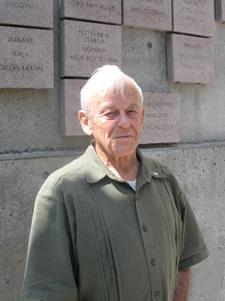A lot of people walk by the Canadian Human Rights Monument on Elgin St and don’t know the history of it.
So says George Wilkes, 87, treasurer of the Canadian Tribute to Human Rights, the group responsible for the monument. He was also a co-founder, one of a handful of gay people involved with the project since its inception.
“People from the gay community were heavily involved, as they still are. It wasn’t a question of how gays got involved. They just did. That’s one reason why the monument is still used as a place to hold vigils for the AIDS walks,” says Wilkes.
The monument has attracted some interesting political figures. It was unveiled by the Dalai Lama in 1991. In 1998, Nelson Mandela unveiled a plaque commemorating the 50th anniversary of the Universal Declaration of Human Rights. It specifically honoured Canadian John Peters Humphrey, the first director of the United Nations Human Rights Division and an early author of the declaration.
Nowadays, the monument is used as a meeting ground for local, national and international protests, vigils, walks, and meditation groups.
Wilkes says his interest in human rights stemmed from active service in the gay community. He was an early member of Gays of Ottawa and he says that even in the early years, he and Norman, his partner of 59 years, were not shy about being a gay couple.
At the age 50, Wilkes retired from his federal government job. He felt he could find more interesting things to do. He supported gay activism through Egale Canada, a national lobby group and a key donor to the monument.
In 1983, Wilkes was a member of Action Sandy Hill working to get the city to recognize the neighbourhood’s heritage value. It was also the 35th anniversary of the Universal Declaration of Human Rights.
During that time, a Polish group in Ottawa requested that Daly Ave, home to many of Sandy Hill’s embassies, be renamed to Solidarno??, Polish for “solidarity.” It was also the name of a trade union movement in that country with ties to international human rights activists.
“In principal, they were pushing to overthrow the communist government. Daly Ave was a heritage street. They were requesting something a little too political for a street name,” says Wilkes.
But Wilkes felt the Polish community had a point: a symbol for human rights was needed in Ottawa.
“We thought the City of Ottawa should make a formal recognition of human rights. So, it was brought forward to city council. They said ‘we’ll support it as long as someone pays for it.’ That’s how our organization came into being,” says Wilkes.
A design competition began in 1985. A jury was created to judge the designs from the 120 applicants across Canada. In 1988, the panel of jurors chose Montreal artist Melvin Charney to build it.
But the monument is more than a symbol. It is also a charitable organization with a full board of directors. All these years later, Wilkes still sits on the board.
“It’s my sense of responsibility as a citizen. Once you embark on a project like this, you deal with it fully,” says Wilkes.
Now, the group is raising funds to finish the monument and maintain it, says fellow board member Richard Rutherford.
“It’s a civilian project, not a government project,” says Rutherford.
And maintenance of the monument is expensive. The goal is to raise $225,000.
Rutherford says the money will be used for three parts:
* an endowment to have the funds to maintain it,
* make sure it can be lit at night ($60,000 for installation and materials), and
* to complete work in the interior of the monument, called House of Canada, which houses Aboriginal languages component of the monument.
“When the job was done, we folded up tent. But there’s a civic responsibility. When you build something like the monument, you have to leave something in place to maintain it. We’ll accept help from anyone,” says Wilkes.
TAG: The Canadian Tribute to Human Rights is a charitable organization and issues tax receipts for all donations. Visit the monument online at http://www.cthr-mcdp.com. Anyone who wants to send a cheque or money order directly to the organization can do so at: The Canadian Tribute to Human Rights, 99 Fifth Avenue, Suite 170, Ottawa, ON K1S 5P5.

 Why you can trust Xtra
Why you can trust Xtra


